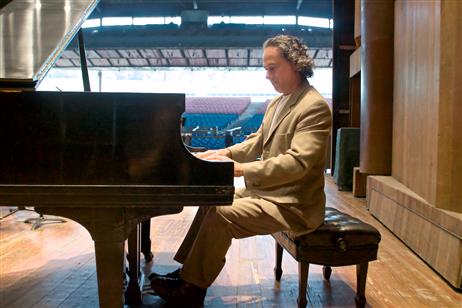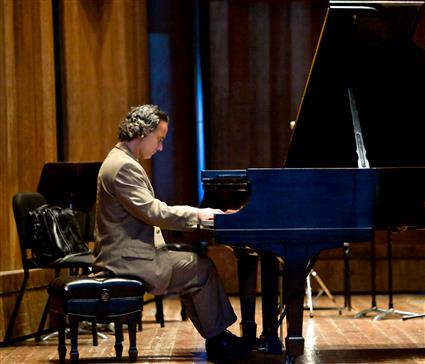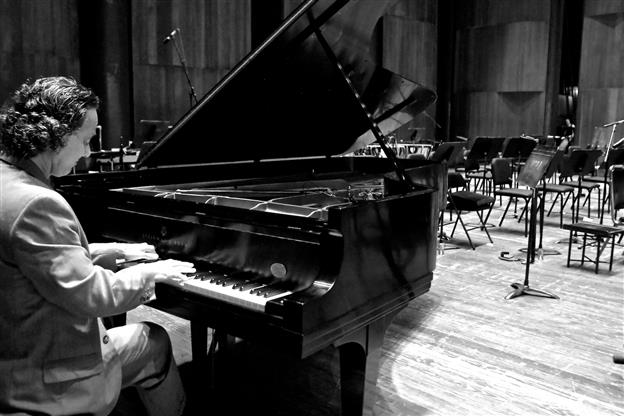Studio of Nishan Aghababian

|
For me, music is like breathing! And playing the piano is like flying! It is this exhilaration that I want to share with my students and everyone I meet. But it’s also about the sheer joy of making music at the piano as a way to connect to your own creativity and expressiveness. I don’t want students to play like me; I don’t want them to play like this pianist or that pianist; I want them to play like themselves. I’ll never forget my first lesson with Robert Helps, oh so many years ago. I learned more about piano playing in 15 minutes than I had in the previous 15 years. And the most important lesson I learned that day, was that MY ideas were as valid as HIS (or anyone else’s) and that he was there to help ME convey MY ideas more accurately and more fluidly at the piano; to express myself, to create something fresh and to captivate those listening so that they too can soar with the music.
|
| I’ve always been a sort of ‘rebel’ when it came to studying the piano. I think it may have come from being ‘blown-away’ as a young pianist by the great pianists of the ‘Golden Age’ - Rachmaninov, Freidman, Cortot, Freidheim and then Lipati, Kapell, Solomon and of course Horowitz who all had their own unique, individual (and sometimes quirky) voice at the piano. I think that having had a number of teachers who seemed to convey that my ideas were invalid and my only option was that I had to copy them because they were the ‘maestro’ might have had something to do with it too. That didn’t sit too well for someone who relished the individuality of those GREAT pianists of bygone years and for someone who’s first word as a baby was “WHY?” It wasn’t mama or papa, it was WHY?! I could never understand those ‘master’ teachers who would say to a student (with a hushed voice, chin resting in hand, far-off gaze - as if to gain ‘insight’ from the cob-web-infested corner of the concert hall), “you need to make this more … hmmm … how shall I say? … more … hmmm … … … purple.” WHAT DOES THAT MEAN!?! Or another teacher who would insist upon forcing students to “crescendo in measure 45” and when asked my favorite question - WHY? They would say, “Because Beethoven put it there!” While it is true musicians should respect a composer's score; if a student is a bundle of knots (physically), is unable to focus on the music (having a scattered torrent of ‘head-chatter’ going on), or has no concrete ideas of their own to share - it won’t make a bit of difference if he does a crescendo in measure 45 or earlier or later or not at all because the result will be the same. The music won’t flow, it won’t communicate, it will just “get louder in measure 45 because he was told to do it.” That’s not music making! That’s not creativity! That’s just a copy-of-a-copy. It’s monkey-miming.
|
|
 |
Which brings me to what I believe a piano lesson should be and what music making is truly about. I call it E3: Explore, Experiment, Evaluate. Of course the basics must be imparted and learned, but just as importantly, along the way, an educator should also present many options for students to explore (and encourage them to do their own exploring); that is giving students the space (and ‘permission’) to try out many, many things even if they seem crazy. Then help them experiment; that is, help them find ways to bring all those ideas, options and possibilities to life at the piano. And finally to help them evaluate; that is help them with the tools they need to self-evaluate - starting with: Do I like what I am doing and how I am doing it? Is it coming out of the piano how I imagined it? What can I do to make MY ideas come out of the piano freely without effort? Is it ‘honest’ and true and does it captivate those listening? What’s working? What’s not? There’s actually another ‘E’ in there as well - eager; that is, instill in students the eagerness and wonderment of making music at the piano to return to that cycle and keep at it over-n-over again to improve themselves; not only as pianists but as individuals.
|
|
As Aristotle said, “We are what we repeatedly do. Excellence, then, is not an act, but a habit.” Some anecdotes, if I may, which I think help define who I am as a pianist and where I stand as an educator [where necessary, the names have been withheld to ‘protect’ the guilty]. Again the names have been withheld here to protect the guilty. I’ll never forget the story about how during the intermission at a concert of a famous pianist, one ‘camp’ of students had a ‘run-in’ with another ‘camp’ of students who were ‘swooning’ over how ‘wonderful’ the pianist was and how ‘inspired’ his playing was. And the leader of the former camp said, “Well, maybe, I guess … but IT’S NOT ANY FUN!” You can probably guess which camp I belonged to. If music isn’t fun, what’s the point? And I don’t mean ‘funny’ (though it can be) and I don’t mean ‘disrespectful’ of a somber, profound work such as the slow Funeral March movement of Chopin’s 2nd Piano Sonata for example. If a penetratingly serious work of music is performed captivatingly, fluidly, without the constipating fuss of ‘faithfulness-to-the-score’ accuracy or forcing a seriousness … then it’s FUN (in the sense of being passionate, pleasurable, enjoyable, moving, intense, with excitement and without being boring)! Shouldn’t this be the kind of pianist we all strive to be? And shouldn’t this ultimately be the kind of person we might all become through piano study? One who can be articulate, who is confident and who is creative. |
|
|
|
|
| After all, who you are as a person - IS who you are as a pianist.
And who you are as a pianist - IS who you are as a person. It all connects and MUST be individual. This is the kind of pianist I strive to be; one who has his own voice and, as a teacher, it is also what I strive to instill in students; so that they may find their own voice. I like to think of it as 'Creative Excellence in Piano Study' and perhaps, it might also be summed up as ‘life skills through piano study’ … Nishan Aghababian |
 |